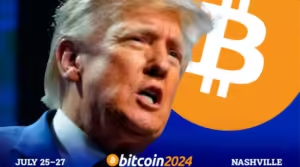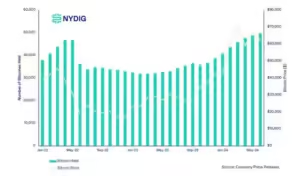On the Margin Newsletter: Inside Trump’s Monumental Meeting with Bitcoin Miners

Quicktake:
- Event: Trump’s pivotal meeting with Bitcoin miners.
- Participants: Marathon Digital execs and other industry leaders.
- Key Issues Discussed: Fair treatment of the industry, competition with China, and policy proposals.
- Election Context: Possible influence on voter sentiment amid the upcoming presidential election.
Welcome to the On the Margin Newsletter, brought to you by Ben Strack, Casey Wagner, and Felix Jauvin. Today, we delve into a landmark meeting between former President Donald Trump and key figures in the Bitcoin mining industry, shedding light on its potential implications for the crypto sector and the broader political landscape.
On a humid Tuesday in Florida, a significant event unfolded at Mar-a-Lago’s tea room. Marathon Digital’s CFO Salman Khan and Jayson Browder, the company’s VP of government affairs, joined other prominent industry peers for a meeting with Trump. According to Browder, approximately 30% of the world’s Bitcoin hash rate was represented in the room, underscoring the meeting’s importance.
Trump, standing at the forefront of the room, was flanked by Sen. Bill Hagerty, R-Tenn., and surrounded by policy advisers and executives from nearly a dozen mining firms, including Riot Platforms and CleanSpark. This assembly of influential figures signaled a noteworthy moment for the Bitcoin mining industry.
During the meeting, Trump examined an ASIC machine brought by Marathon Digital, made by the California-based company Auradine. “He held it in his own hands and said it’s a beautiful American technology,” Khan recounted. This moment symbolized Trump’s recognition of the technological advancements within the US Bitcoin mining sector.
Khan and Browder presented Trump with specific policy proposals, though they opted not to disclose the details. However, Browder emphasized the core messages they conveyed: the need for fair treatment of the industry and the desire to build a robust Bitcoin mining business in the United States. These points reflect the industry’s broader goals of achieving regulatory clarity and fostering a favorable business environment.
A critical question arises: was this meeting a genuine effort by Trump to support the Bitcoin mining industry, or was it a strategic move to garner votes in an election year? As a convicted felon facing a tight election race, Trump cannot afford to alienate any potential supporters. Similarly, President Joe Biden faces ongoing voter concerns related to his age, making every vote crucial.
Understanding Trump’s sincerity is challenging without access to the nuances of the conversation. Nevertheless, Khan noted that Trump was surprisingly well-informed about the issues facing Bitcoin miners, such as permit hurdles and difficulties in opening bank accounts. This awareness suggests a deeper engagement with the industry’s challenges than one might expect from a mere publicity stunt.
Moreover, Trump demonstrated an understanding of the “great-power competition” between the US and China, particularly in the realm of AI, a segment increasingly supported by Bitcoin miners. This geopolitical context underscores the strategic importance of maintaining and advancing the US’s position in technological innovation, including Bitcoin mining.
Trump’s post on Truth Social, where he expressed a desire for “all the remaining bitcoin to be made in the USA,” further illustrates his recognition of Bitcoin mining’s significance. This statement aligns with a broader vision of technological self-sufficiency and leadership in the digital economy.
Khan suggested that Trump had reached the “aha moment” that many experience after learning about Bitcoin’s potential. This realization may indicate a genuine interest in fostering the industry, beyond the immediate political gains.
The meeting also highlighted the ongoing efforts within the Bitcoin mining community to advocate for favorable policies. Marathon Digital and its peers are actively engaging with policymakers to address regulatory challenges and promote the industry’s growth. This proactive approach is crucial for ensuring that the US remains a competitive and attractive location for Bitcoin mining operations.
While the meeting’s long-term impact remains to be seen, it marks a significant milestone in the relationship between the Bitcoin mining industry and political leaders. The dialogue initiated at Mar-a-Lago could pave the way for more substantive policy discussions and collaborations in the future.
As the US presidential election draws nearer, the stance of political leaders on Bitcoin and cryptocurrency issues will likely influence voter sentiment. The engagement of high-profile figures like Trump with the Bitcoin mining industry underscores the growing importance of digital currencies in the political discourse.
In conclusion, Trump’s meeting with Bitcoin miners at Mar-a-Lago was a monumental event, reflecting both the industry’s aspirations and the evolving political landscape. As Marathon Digital and other industry leaders continue to advocate for fair treatment and supportive policies, the future of Bitcoin mining in the US remains a critical area to watch. The interplay between technological innovation and political strategy will undoubtedly shape the trajectory of the crypto sector in the coming years.
4o



